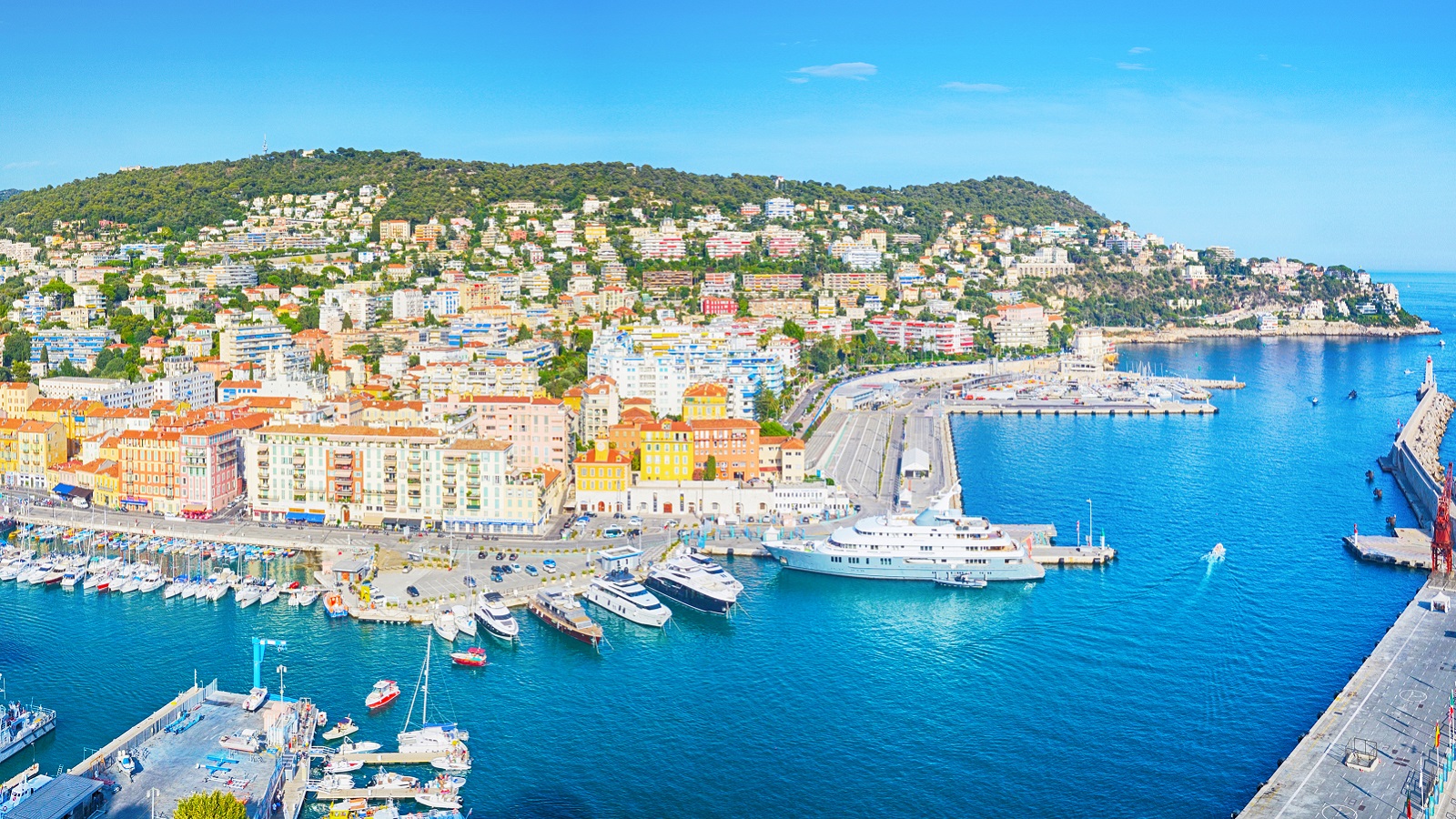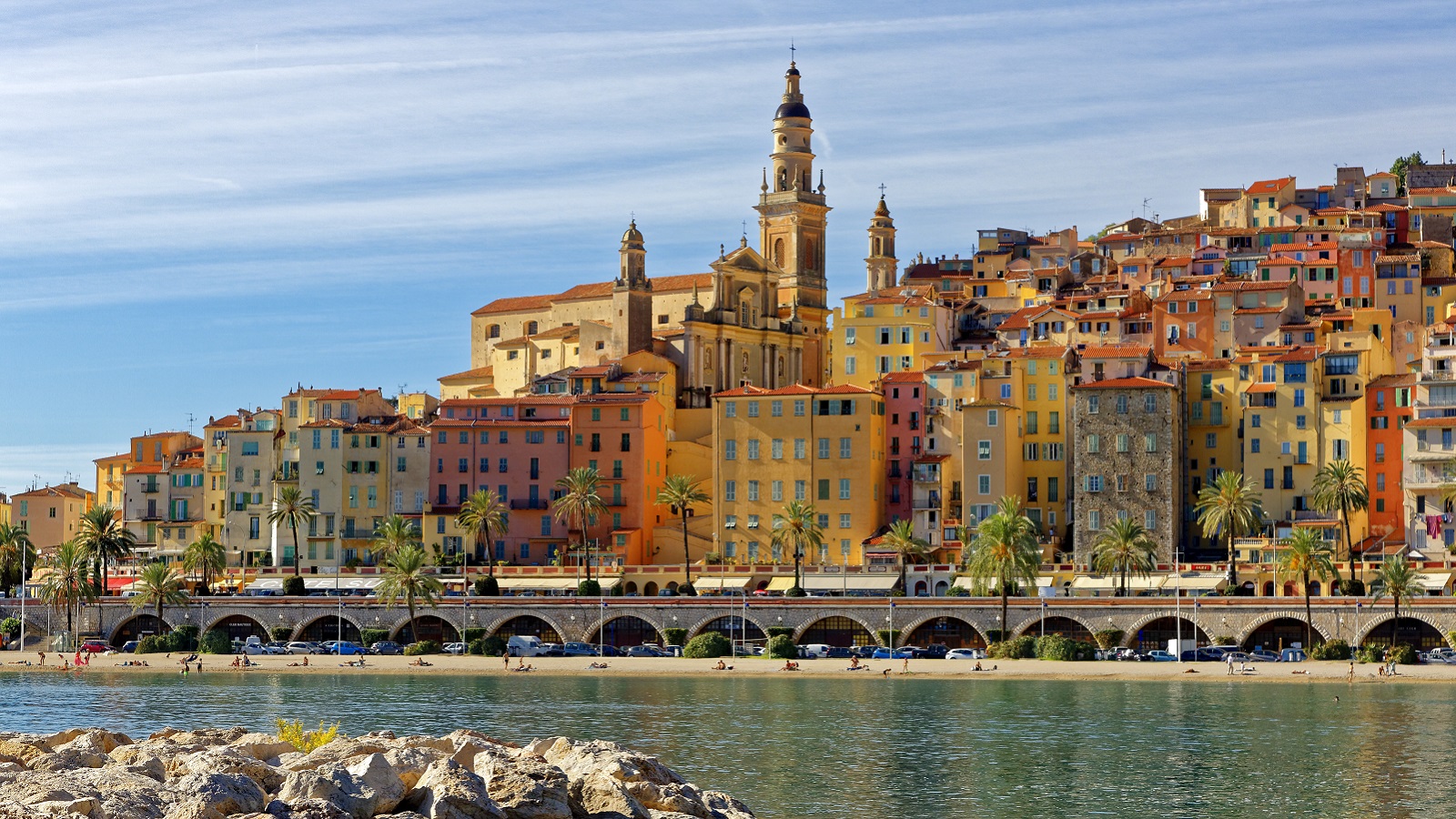Retire in France for Beauty and Culture
France offers a great history and a slower pace of life for retirees. At times, it can feel like stepping into a postcard.


Profit and prosper with the best of Kiplinger's advice on investing, taxes, retirement, personal finance and much more. Delivered daily. Enter your email in the box and click Sign Me Up.
You are now subscribed
Your newsletter sign-up was successful
Want to add more newsletters?

Delivered daily
Kiplinger Today
Profit and prosper with the best of Kiplinger's advice on investing, taxes, retirement, personal finance and much more delivered daily. Smart money moves start here.

Sent five days a week
Kiplinger A Step Ahead
Get practical help to make better financial decisions in your everyday life, from spending to savings on top deals.

Delivered daily
Kiplinger Closing Bell
Get today's biggest financial and investing headlines delivered to your inbox every day the U.S. stock market is open.

Sent twice a week
Kiplinger Adviser Intel
Financial pros across the country share best practices and fresh tactics to preserve and grow your wealth.

Delivered weekly
Kiplinger Tax Tips
Trim your federal and state tax bills with practical tax-planning and tax-cutting strategies.

Sent twice a week
Kiplinger Retirement Tips
Your twice-a-week guide to planning and enjoying a financially secure and richly rewarding retirement

Sent bimonthly.
Kiplinger Adviser Angle
Insights for advisers, wealth managers and other financial professionals.

Sent twice a week
Kiplinger Investing Weekly
Your twice-a-week roundup of promising stocks, funds, companies and industries you should consider, ones you should avoid, and why.

Sent weekly for six weeks
Kiplinger Invest for Retirement
Your step-by-step six-part series on how to invest for retirement, from devising a successful strategy to exactly which investments to choose.
Editor’s note: "Retire in France" is part of an ongoing series on retiring abroad. To see all the articles in the series, jump to the end of this story.
Enjoying fresh, warm croissants on the cobblestone streets of Alsace, sharing a glass of wine at a Parisian café, mingling with the locals along the French Riviera, or sauntering through acres of lavender fields in Provence — all are possible when you retire to France.
“France is one of the calmest and most beautiful countries," said Salvador Ordorica, CEO and founder of the Spanish Group, a certified translation service that helps international clients. "Life in France feels slower and more peaceful."
From just $107.88 $24.99 for Kiplinger Personal Finance
Become a smarter, better informed investor. Subscribe from just $107.88 $24.99, plus get up to 4 Special Issues

Sign up for Kiplinger’s Free Newsletters
Profit and prosper with the best of expert advice on investing, taxes, retirement, personal finance and more - straight to your e-mail.
Profit and prosper with the best of expert advice - straight to your e-mail.
Ordorica, who studied at the Institut d'études politiques de Paris (commonly referred to as Sciences Po), lives in Paris part-time on an annual basis. He said that France is the complete package for Americans looking for comfort and suitability.
“France has everything a retiree can need — charming villages, long lunches, access to art and culture everywhere you look, and a vast number of calm and quiet cities nearby to visit,” he said. “On top of that, the French safety and health care system is a major plus. It just functions so beautifully.
“For retirees who want a slower pace without giving up sophistication, France is one of the best places to retire,” he said.
Before bidding the U.S. adieu and heading to France, retirees need to get a grip on the essentials, including legal residency requirements, health care options, taxes and income and the cost of living, among others.
Living in France as a legal resident

For U.S. retirees, the primary worry about living in France is getting and maintaining legal residency.
There are different visas based on whether you want to stay as a temporary visitor, a resident or to work. Retirees must understand which visas they can apply for and what those visas allow them to do.
“Some French visas allow retirees to have passive income (such as from real estate), but they don't allow you to make any other forms of income at all, even if it's from a hobby like painting or jewelry making,” said Sarah Pardi, travel expert at Insurte and an American expatriate who lives in Paris.
“French visas are quite specific," she said, "so retirees must choose the correct one for their unique situation and follow its rules.”
For many retirees, the best bet is probably to get a Long-Stay Visa, or a Visa de Long Séjour valant Titre de Séjour (VLS-TS). Once approved, the Long-Stay Visa allows for a four-month to one-year stay in the country. After the year is up, you can apply for a temporary residence card that's valid for an additional year.
You can apply for the visa at any French consulate in the U.S. Expect to prove a moderate minimum monthly income of about $1,400 when filling out the application.
“You’ll need to obtain a long-stay visa (VLS-TS) that serves as a provisional residence permit valid for (up to) one year,” said Joe Cronin, president of International Citizens Insurance. “This can be validated at the French Immigration Office upon arrival and later on renewed through a carte de séjour process so that you can stay beyond the first year."
Foreign nationals who want to stay in France permanently in retirement can do so by applying for a Carte de Résident, open to non-citizens who have lived in France for five years.
Navigating health care as a retiree in France

Health care is readily available in France, and it's easy to schedule a doctor's appointment.
“Whether or not you can be on the state-funded social health care depends on your visa/long-term goals," Pardi said. “Even if you’re eligible for social health care, there will still be a period where you aren't on it, meaning you may need to pay out of pocket for care received or find a private health insurance option that can cover you in France — and note that Medicare cannot.”
Once you arrive in France, it’s essential to act quickly to get a good health care plan. “France has a robust global health care system for its residents and citizens, but not everyone can necessarily get access to it, and especially not immediately upon entering the country,” Pardi noted.
“Retirees need to consider their options when it comes to health and wellness, and they may need to take out private French health insurance to make sure that they can have any routine treatments, medications, and checkups covered," she said.
Americans in Paris will also need to get used to some realities when engaging with the French health care system.
“France is a universal health care country, which means everyone must have the French government insurance policy, which is mandatory after three months,” said Robert Levitt, founder and CIO of Levitt Capital Management, based in Nice, France.
“When you see the doctor, there usually aren’t nurses and receptionists," he said. "You ring the buzzer and enter to find a seat. The doctor then calls you. There is no other professional working in the office. The total cost of a doctor's visit is around $25. But France does charge a tax on investment income, which is applied to the cost of health care.”
Dealing with taxes and finances when retiring to France

Financially, France is one of the most favorable destinations for U.S. retirees looking to move overseas. “That’s primarily because the U.S.-France tax convention is extremely favorable,” Levitt said.
Unlike in most of Europe, pensions and Social Security in the U.S. are taxed at much lower rates than locals pay. And investments in U.S. companies also receive favorable treatment.”
French-minded retirees also need to know that the financial management system in France is different than in the U.S.
“For example, a CPA in the U.S. is what France calls a fiscal avocation, or tax attorney,” Levitt said. “Estate planning is often done by a notary, who in the U.S. is someone who guarantees your signature. Consequently, the roles for select financial advisers are different.”
Another big challenge is the estate tax.
“People need to understand that when they live in France, they are subject to French taxes and French laws,” Levitt noted. “They are limited in who they can choose as beneficiaries of their estate.
"Plus, holding a U.S. revocable trust is basically worthless. In fact, worse than that, because you have to make expensive tax filings and get none of the benefits of a trust.”
Cost of living in France as a retiree

The cost of living in France, especially outside such big cities as Paris, Marseille, Lyon, and Toulouse, is reasonable. It’s highly advisable to visit key areas of interest before writing any rent or mortgage checks.
“You can rent a two-bedroom place in smaller towns for under $1,000 a month, maybe $700 if you’re inland,” said Steven Kibbel, founder at Kibbel Financial Planning and a senior contributor at Prop Firm App. “Buying will run anywhere from $150,000 to $300,000, depending on where you land.”
Many of Kibbel’s clients move to such places as the Dordogne or parts of Alsace because of the price points, but they also offer an easy lifestyle. “They’re beautiful, but not tourist-heavy. If you want Nice or Paris, expect prices to jump,” he said.
In smaller towns, “dinner out is affordable," he said. "$25 per person covers a nice sit-down meal. Retirees can eat well for a $100-a-week grocery budget, especially if they use local markets.”
Paris is, by far, the most expensive place to live in France, yet expats find the cost of living significantly lower than in major cities in the U.S. “Phoenix, Arizona, for example, is only slightly less expensive than Paris,” Pardi said.
“In most cases, buying or renting a home will be less expensive than it is in major U.S. cities, but might be comparable to rural areas. It's hard to give a specific number, because France has a lot to offer at pretty much any price package.”
Pardi also noted that dining out, groceries and utilities are less expensive than in the U.S. "A cellphone and Wi-Fi plan might cost you over $100 a month in the U.S., but in Paris, you can bundle the two for $25,” she added.
Where in France should you retire?

Picking a region, city or town in France comes down to what works for you as a retiree.
“It’s unique to everyone,” Pardi said. “If you're looking for sunny weather, Nice is a great option that offers city living and easy access to other European cities. Paris is always a popular option, but it is rainy and expensive, relative to other French cities.”
Pardi says when thinking about where to choose, consider the following factors:
- How easy is it to get there? Is there a train station or airport, for example?
- How mobility-friendly is it? Are there elevators?
- Is there quick access to groceries and health services?
- What is the weather like?
Levitt prefers the Côte d’Azur for his French home. “It has a very active expat life, but it also has an international airport, which is important," he said. "It is less than one hour from Italy, and outstanding snow skiing in the French and Italian Alps is only a couple of hours away.”
What really matters when moving to a new country is intellectual stimulation, some travel experts say. “While some people choose quaint and beautiful villages, at some point, it is nice to be able to converse with those who share similar experiences,” Levitt said.
On the upside, France has something for everybody.
“Dordogne is a favorite for a reason,” said David Kindness, a certified public accountant and personal finance writer at Best Money, a personal finance advisory platform. “It’s affordable, full of history, has a good number of fellow expats and doesn’t feel too isolated."
He noted that "Occitanie is warmer, with a Mediterranean coast nearby, and you still get decent property prices. Provence is stunning but pricier. Alsace is different — more structured, more influenced by Germany, but still welcoming.”
Again, it depends on what pace you’re seeking. “Some like the sun, others want space,” Kindness said. “There’s no perfect answer.”
Some lesser-known, yet intriguing locations to visit are Caen, Troyes, and Amboise, Pardi added.
Traveling to France

There are many direct flights from the U.S. to major cities and regions in France, such as Paris, Nice, and the French Riviera.
“Phoenix now has a direct flight to Paris,” Pardi noted. “So do Seattle and L.A., New York, Chicago, and San Francisco. Most of these cities also have non-stop flights to Nice. Nowadays, direct flights to major French cities are fairly common.”
Once you're in France, trains do the rest. “You can be across the country in a few hours. It's reliable and well connected, which is one less thing to stress over,” Kindness said.
Retiring in France: the Takeaway
Like any foreign locale, retiring to France has its ups and downs.
"France checks a lot of boxes for retirees from the U.S. — great health care, strong infrastructure, and enough cultural depth to keep you from getting bored,” Kindness said. “It’s not the cheapest in the EU (European Union), but you get what you pay for.”
Kindness said he’s worked with clients planning their move, and for most, the appeal isn't just the scenery or food.
“It’s the slower pace, the walkable cities, and just feeling like life has more breathing room,” he noted. “Some clients mentioned they started sleeping better, eating better and walking more. Not huge changes on paper, but they add up.”
The bureaucracy, however, can be a hurdle.
“That’s probably the most consistent issue people run into,” Kindness said. “Paperwork, delays, requirements shifting depending on who you talk to — it’s frustrating, and you have to go in with realistic expectations.”
You’ll need proof of income, visa documents and language basics for renewals. “Some retirees are caught off guard by how long it takes just to get health coverage or open a local bank account,” he added. “The move has to be planned out months ahead, not weeks.”
More on Where to Retire Abroad
- Retire in Malta for Quiet Coastal Perfection
- Retire in Mexico: Get a Lower Cost of Living Near the US
- Best Places for LGBTQ People to Retire Abroad
- Living in Portugal as a US Retiree
- Living in Panama Provides Stability and Charm
- Retire in Thailand, Where 'The White Lotus' Was Filmed
- Where to Retire: Living in Brazil Is More Than Carnival, Coffee and Copacabana
- Where to Retire: Living in the Dominican Republic
- Where to Retire 2025: Puerto Rico
- Return to Your Home Country to Retire: Repatriation Retirement
- How to Manage Retirement Savings When Living Abroad
Profit and prosper with the best of Kiplinger's advice on investing, taxes, retirement, personal finance and much more. Delivered daily. Enter your email in the box and click Sign Me Up.

A former Wall Street bond trader, Brian O’Connell is the author of two books: “The 401k Millionaire” and “CNBC’s Creating Wealth.” He's written for national finance publications such as TheStreet.com, CBS News, The Wall Street Journal, U.S. News & World Report, Forbes, Fox News and others. With 20 years of experience covering business news and trends, he believes education is the best gift a financial consumer can receive – and brings that philosophy to his work. Brian is a graduate of the University of Massachusetts, and currently resides in Palmas del Mar, Puerto Rico during the winter, and in Bucks County, Pa., when Mother Nature cooperates.
-
 Dow Adds 1,206 Points to Top 50,000: Stock Market Today
Dow Adds 1,206 Points to Top 50,000: Stock Market TodayThe S&P 500 and Nasdaq also had strong finishes to a volatile week, with beaten-down tech stocks outperforming.
-
 Ask the Tax Editor: Federal Income Tax Deductions
Ask the Tax Editor: Federal Income Tax DeductionsAsk the Editor In this week's Ask the Editor Q&A, Joy Taylor answers questions on federal income tax deductions
-
 States With No-Fault Car Insurance Laws (and How No-Fault Car Insurance Works)
States With No-Fault Car Insurance Laws (and How No-Fault Car Insurance Works)A breakdown of the confusing rules around no-fault car insurance in every state where it exists.
-
 Why Picking a Retirement Age Feels Impossible (and How to Finally Decide)
Why Picking a Retirement Age Feels Impossible (and How to Finally Decide)Struggling with picking a date? Experts explain how to get out of your head and retire on your own terms.
-
 For the 2% Club, the Guardrails Approach and the 4% Rule Do Not Work: Here's What Works Instead
For the 2% Club, the Guardrails Approach and the 4% Rule Do Not Work: Here's What Works InsteadFor retirees with a pension, traditional withdrawal rules could be too restrictive. You need a tailored income plan that is much more flexible and realistic.
-
 Retiring Next Year? Now Is the Time to Start Designing What Your Retirement Will Look Like
Retiring Next Year? Now Is the Time to Start Designing What Your Retirement Will Look LikeThis is when you should be shifting your focus from growing your portfolio to designing an income and tax strategy that aligns your resources with your purpose.
-
 I'm a Financial Planner: This Layered Approach for Your Retirement Money Can Help Lower Your Stress
I'm a Financial Planner: This Layered Approach for Your Retirement Money Can Help Lower Your StressTo be confident about retirement, consider building a safety net by dividing assets into distinct layers and establishing a regular review process. Here's how.
-
 Your Adult Kids Are Doing Fine. Is It Time To Spend Some of Their Inheritance?
Your Adult Kids Are Doing Fine. Is It Time To Spend Some of Their Inheritance?If your kids are successful, do they need an inheritance? Ask yourself these four questions before passing down another dollar.
-
 The 4 Estate Planning Documents Every High-Net-Worth Family Needs (Not Just a Will)
The 4 Estate Planning Documents Every High-Net-Worth Family Needs (Not Just a Will)The key to successful estate planning for HNW families isn't just drafting these four documents, but ensuring they're current and immediately accessible.
-
 Love and Legacy: What Couples Rarely Talk About (But Should)
Love and Legacy: What Couples Rarely Talk About (But Should)Couples who talk openly about finances, including estate planning, are more likely to head into retirement joyfully. How can you get the conversation going?
-
 We're 62 With $1.4 Million. I Want to Sell Our Beach House to Retire Now, But My Wife Wants to Keep It and Work Until 70.
We're 62 With $1.4 Million. I Want to Sell Our Beach House to Retire Now, But My Wife Wants to Keep It and Work Until 70.I want to sell the $610K vacation home and retire now, but my wife envisions a beach retirement in 8 years. We asked financial advisers to weigh in.